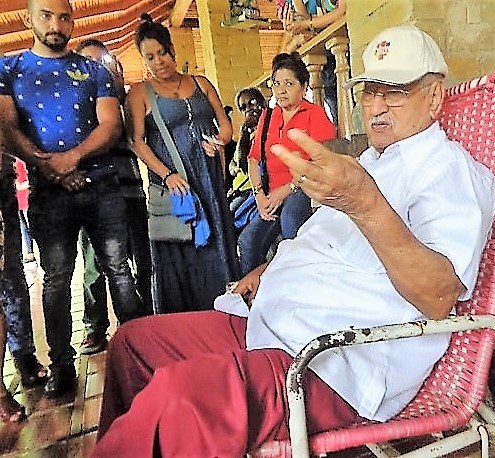
For Hugo de los Reyes Chávez, the mysticism of the intelligent, restless child with exceptional feelings for humanism and many other virtues “still lives on in this country house where he spent many years of his childhood”.
On July 25, 2019, we spoke to his father about Hugo Chávez Frías Hugo de los Reyes, or simply El Maestro, as family, friends and acquaintances still call him today, based on his long-standing profession.
The interview took place in the wide portal of a building surrounded by a very welcoming rural atmosphere in Sabaneta, home of the Eternal Commander, in the state of Barinas.
I return to recordings, notes written with indescribable emotion and the text written at the time to once again pay tribute to Hugo Chávez Fría, this time on the tenth anniversary of his passage to immortality, from which his work and his character emerge the struggle to defending the violated rights of the poor on earth.
And El Maestro, the father who raised him with values that elevated him to the hearts of all of Venezuela, all of America and the whole world; The same one who accompanied and always followed him in his childhood escapades assures: “His adventures remain here, the songs, the joy, all those memories, he is all here with us. Commander Chavez. Mister”.
“Projection and guidance is home education. And I had the opportunity, the privilege, the grace of God, I would say, to be his teacher in the fifth grade at the Julian Pino School in Sabaneta; A good student by the way. One time I had him do the final exam to pass sixth grade so people wouldn’t think I was ripping him off because he was my son and he got the 20 points, the maximum, in writing and speaking.” he remembers .
Notwithstanding the blood relationship, he defines him: “He was always a good student, a good athlete, a good son, a good friend and very hardworking. He was very fond of exploring history deeply and he had a great sense of camaraderie, very good with his friends, his little brothers, with everyone. He was always like that in life, from childhood to his death. He was very philanthropic.”
This passion for history brought him closer to Simón Bolívar, from whom he learned and understood emancipatory principles and social justice, and shaped “his great sense of love for the fatherland”, as he says with nostalgia for the physical loss of offspring, and the brave son He gave back body and soul to the peoples of Our America Bolívar to lead the struggle for the salvation of the least.
“Chávez spent his youth studying and playing sports, mainly baseball, which he loved very much. His whole life was learning. His attitude brought many friends to the house, they played, but most of all they studied, he taught the other boys,” he recalls.
The last time Hugo came to Sabaneta, “he did it around four in the morning and he arrived singing, and there the six Chávez brothers were singing, hugging, and in this house there are pure memories, I hardly open it, and Elenita – he refers to his wife Elena Frías de Chávez and Hugo’s mother – comes here very rarely and always cries a lot because of the memories. The mother is a mother and there is nothing better than a mother’s love, that is a great truth”.
Hugo de los Reyes assures that there are still many things to be done to complete the work of Bolívar, Martí, Fidel and Chávez. We continue to work despite these great difficulties due to the economic blockade that the Empire has against us.”
And because of his pedagogical knowledge, he considers it essential to raise people’s awareness, because “there are many people who need more awareness of the importance of what revolution is, what socialism is”.
These reflections are part of a larger interview with El Maestro about the son, the leader who has transcended his homeland and is an undeniable part of the history of Venezuela, all of America, that still needs changes in favor of the great masses. whom neoliberalism denies them their most basic human rights.

